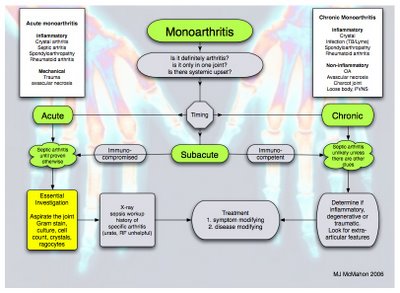This week’s two minute tutorial theme was monoarthritis. We heard about Gout (CC), Investigation (GYD), septic arthritis (KP), RA (DK), epidemiology (MH) and pseudogout (SM).
I found the talks detailed and well delivered. A deal of work obviously went into each talk but I award the prize this week to Dr Pearson for a well presented talk with just the right amount of information for two minutes, a clear handhout and citing of sources.
In the approach to monoarthritis the important considerations are:
Is this a problem in a joint (arthritis)?
Is it monoarthritis (or are more joints involved)?
Then get some synovial fluid or get someone who can and ask yourself "How likely is sepsis? can I exclude it?"
The latter question is critical especially in the setting of acute monoarthritis, or sub-acute monoarthritis in the immunocompromised patient. I generally take the view that when I cannot show it is not sepsis, it should be treated as septic arthritis until an alternative diagnosis is found.
Remember that gonococcal arthritis presents differently to non-gonococcal pyogenic arthritis. (have a look at UpToDate)
A podcast will follow soon, until then, a useful description can be found in
Infection and arthritis.
Next week’s theme is connective tissue diseases:
SLE (GYD)
Sjögren’s Syndrome (PK)
Myositis (MH)
Systemic sclerosis (CC)
Behçet’s disease (SM)
Diagnosis (DK)
These will be difficult to squeeze into two minutes, so you will have to choose your information carefully. Try to think about the assignment as relating to a patient coming to the clinic. What are the important points you would highlight for a student? Be concise and precise, and cite your sources. And why not try to learn a little more be asking yourself what you know about the subjects your colleagues will be talking about?
Interesting topics this week:
I recommend you have a look at the
NEJM’s video on arterial line placement.
Lobar Collapse
The lobar collapse tutorial.
Migratory arthritis (turned out to be CPPD, but make sure you know how to investigate Rheumatic fever)
Next week’s reading will be
The rest is silence. Michael Rowe.
Health Affairs, July/August 2002; 21(4): 232-236. I recommend you read this unhurriedly and with plenty of time for reflection.
MJM
